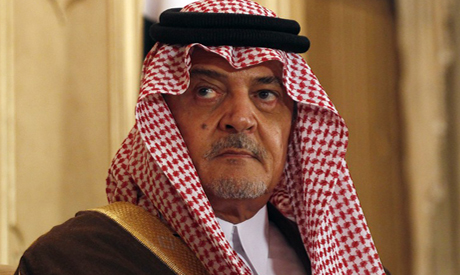
Former Saudi foreign minister Saud al-Faisal. (Photo: Reuters)
Prince Saud al-Faisal, who retired in April after serving 40 years as Saudi Arabia's foreign minister, died on Thursday, family members and a foreign ministry spokesman said, as Reuters and AFP reported.
His tenure saw Israel invade Lebanon in 1978, 1982 and 2006, the eruption of Palestinian intifadas in 1987 and 2000, Iraq's invasions of Iran in 1980 and Kuwait in 1990, and the occupation of Iraq by a US-led coalition in 2003.
Equally at home in Arab robes or a tweed suit and tie, and as fluent in English as in Arabic, Prince Saud proved adept at cutting through diplomatic niceties to deliver Saudi Arabia's message with pith and wit.
During a moment of tension in Saudi ties with its main ally the United States in 2004, he described the relationship as "a Muslim marriage" in which the kingdom could retain different wives if it treated them all with fairness.
He retained that incisiveness even as a chronic back complaint and other maladies in recent years made his hands shaky and his speech slurred.
Asked in early 2012 if it would be a good idea to arm Syria's rebels, he said briskly: "I think it's an excellent idea."
Prince Saud, a son of King Faisal, was born in 1940 in Taif near Mecca, where in 1989 he helped negotiate the agreement that ended Lebanon's 15-year civil war.
A degree at Princeton in the 1960s was followed by years at the Petroleum Ministry, where he was taken under the wing of his father's canny and charismatic oil minister Ahmed Zaki Yamani.
His career as a diplomat began traumatically: the new King Khaled named him as foreign minister following the assassination of Prince Saud's father Faisal, who had retained the foreign affairs portfolio after being made king in 1962.
Complicated History
When he was appointed in October 1975, the region was dominated by Cold War rivalries, and secular pan-Arab nationalism seemed to be the future.
Egypt and Israel had not yet signed the peace treaty, and Yasser Arafat led the Palestine Liberation Organisation from shell-pocked refugee camps in Lebanon. Iran's shah still ruled from his Peacock Throne, while in Iraq a young Saddam Hussein was plotting his path to power.
Riyadh's relationship with Saddam, which went from wary support during the Iran-Iraq war to fierce enmity after the invasion of Kuwait, dominated foreign policy for long periods during Prince Saud's tenure.
But despite that complicated history, Prince Saud publicly argued against the 2003 invasion, presciently warning of a chaotic aftermath that could destabilise the region.
"If change of regime comes with the destruction of Iraq, then you are solving one problem and creating five more problems," he said in a British television interview.
In 2002, he launched Abdullah's biggest foreign policy initiative, an Arab plan for peace with Israel in return for a withdrawal from all occupied land and a resolution of the refugee problem.
"All the neighbourhood, if you will, will be at peace with Israel, will recognise their right to exist. If this doesn't provide security of Israel, I assure you the muzzle of a gun is not going to provide that security," he said at the time.
Yet, Israel never agreed to the plan.
*The story was edited by Ahram Online.
Short link: